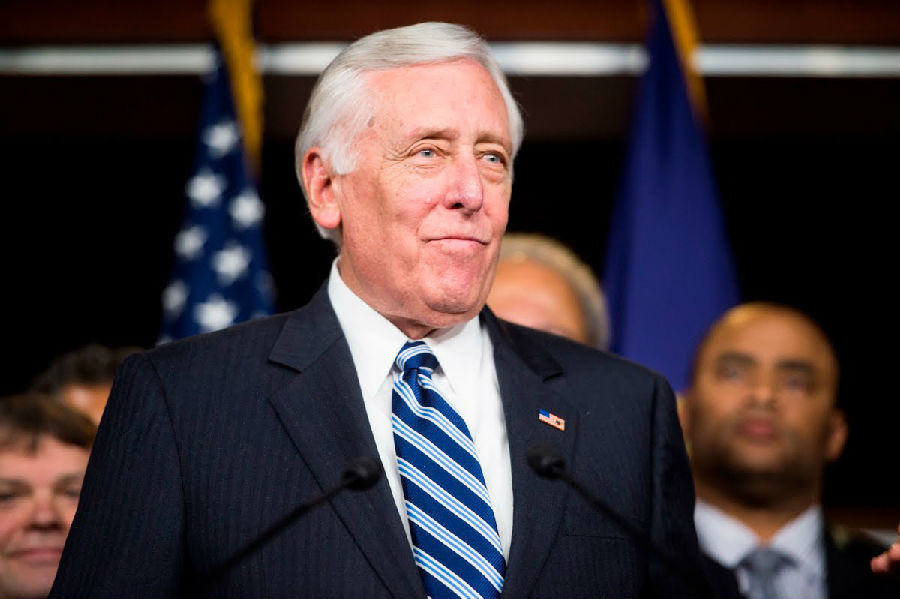"There's an overwhelming consensus that this is about establishing that shutdowns are wrong,"
“絕大多數(shù)人一致認(rèn)為,這是為了讓‘停擺是錯(cuò)誤的’這一觀念得到大家的認(rèn)可,”
said one centrist, Representative Tom Malinowski, Democrat of New Jersey.
中間派、新澤西州民主黨眾議員湯姆·馬林諾夫斯基說道。
"From my standpoint, and I think this is the consensus of the caucus, everything is negotiable.
“從我的立場(chǎng)我是這么認(rèn)為的,而且我覺得這是核心小組的共識(shí),一切都是可以商量的。
Border security is negotiable. Immigration policy is negotiable.
邊境安全問題是可以商量的。移民政策也是可以商量的。
Shutting down the government is not negotiable, and we're angry about it."
但讓政府停擺這件事例外,我們對(duì)這次的停擺是很憤怒的。”
Mr. Malinowski went on: "If we give in to this tactic in any way, we will validate it,
馬林諾夫斯基接著說道:“如果我們屈服于這一策略,不管以怎樣的方式,我們就等于證明批準(zhǔn)了這種做法。
and there will be no end to these shutdowns,
停擺也就永遠(yuǎn)不會(huì)結(jié)束了,
and the people who suffer today will be suffering again and again and again. We cannot have that."
今天受苦的人們將來還會(huì)一次又一次地受苦。我們不能讓事情發(fā)展成那樣。”
House Democrats are also drafting their own plan for border security, which is expected to be made public in the coming days.
眾議院民主黨人也在起草他們自己的邊境安全議案,預(yù)計(jì)將在未來幾天公布。
We are going to be talking about substantial sums of money to secure our border,
“我們即將就用來保護(hù)邊境安全的大筆資金展開討論。”
Representative Steny H. Hoyer of Maryland, the Democratic leader, told reporters.
民主黨領(lǐng)袖、馬里蘭州眾議員斯特尼·霍耶對(duì)記者說。
Representative James E. Clyburn, the No 3. Democrat,
眾議員詹姆斯·克萊伯恩,民主黨的第三把手,
said separately that Democrats could back a $5.7 billion funding measure that included drones and refitted ports of entry — but no wall.
則表示,民主黨人可能會(huì)支持57億美元的撥款議案,其中包括無人機(jī)和重新改裝的入境口岸,邊境墻免談。
That is the amount Mr. Trump has demanded for the wall he wants to build on the southwestern border.
但這一金額恰好就是特朗普想要為西南邊境的邊境墻爭取的預(yù)算金額。

Using the figure the president put on the table,
要用總統(tǒng)提到談判桌上的這一金額,
if his $5.7 billion is about border security, then we see ourselves fulfilling that request, only doing it with what I like to call using a smart wall, he said.
如果說他提的57億美元是用來鞏固邊境安全的資金的話,那么我們認(rèn)為,我們自己是滿足了這一要求的,只不過采用的方式是我所謂的“智能墻”的方式,他說。
Both Mr. Hoyer and Representative Hakeem Jeffries of New York, chairman of the House Democratic Caucus,
霍耶和眾議院民主黨核心小組組長、紐約州眾議員哈基姆杰弗里斯兩人
seemed to leave the door open for eventual negotiations to include talk of some kind of border barrier — so long as the government was open first.
似乎都為將關(guān)于某種形式的邊境墻的討論納入談判的最終談判敞開了大門——條件是政府先結(jié)束停擺。
When asked point-blank if Democrats would agree to talk about a wall,
當(dāng)被直截了當(dāng)?shù)貑柤懊裰鼽h人是否會(huì)同意就邊境墻展開對(duì)話時(shí),
Mr. Jeffries did not say no but reiterated Democratic talking points about what the party favors:
杰弗里斯并沒有說不,不過他也重申了民主黨支持的一些談話要點(diǎn):
new scanning technology to detect drugs and weapons,
比如更新檢測(cè)毒品和武器的掃描技術(shù),
improvements in infrastructure at ports of entry and more personnel, including more immigration judges.
改善入境口岸基礎(chǔ)設(shè)施,配備更多的工作人員,配備更多的移民法官。
Mr. Hoyer was asked whether Democrats might consider
霍耶被問到,民主黨人是否考慮
permanent protections for the young undocumented immigrants known as Dreamers, in exchange for "some new physical barriers."
為年輕的非法移民“追夢(mèng)者”提供永久性保護(hù),條件是“新增一些物理障礙”(即邊境墻)。
He said it was clear that Mr. Trump would put money for a wall on the negotiating table.
他說,很明顯,特朗普會(huì)在談判桌上提給邊境墻撥款的事。
It's clear what the president wants; it's clear what we want, he said.
總統(tǒng)的訴求很明顯;我們的訴求也很明顯,”他說。
If you have a negotiation, both parties are going to put on the table what they want.
“如果展開談判,雙方都會(huì)把他們各自的訴求擺到桌面上來。”
譯文由可可原創(chuàng),僅供學(xué)習(xí)交流使用,未經(jīng)許可請(qǐng)勿轉(zhuǎn)載。



